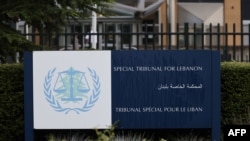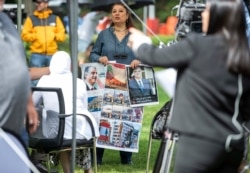Judges at a U.N.-backed tribunal have found one man guilty in the 2005 assassination of former Lebanese Prime Minister Rafik Hariri and acquitted three others charged in the case.
The presiding judge at the Special Tribunal for Lebanon declared that Salim Jamil Ayyash was guilty on all counts, including conspiracy to commit a terrorist act using explosives and intentional homicide of Hariri, the 21 bystanders who were killed in the massive explosion, as well as the attempted murder of the 226 injured persons.
But the court said it could not find beyond a reasonable doubt that Hassan Habib Merhi, Hussein Hassan Oneissi, and Assad Hassan Sabra were guilty of being part of the conspiracy.
All four defendants were tried “in absentia” and have not been seen in years.
The men were low-level operatives with the Lebanese group Hezbollah.
Much of the prosecution’s case centered around phone records of the four Hezbollah operatives charged with planning and carrying out the attack and the ensuing attempt to cover it up.
The defense argued that the evidence was circumstantial and unreliable.
A tribunal judge said Tuesday that while Syria and Hezbollah “may have had motives to eliminate” Hariri, the judges found no evidence that either was involved in Hariri’s assassination.
Syria and Hezbollah were not on trial, but in the aftermath of the assassination, fingers were pointed at Damascus. Massive national protests led to Syria's troop withdrawal from Lebanon.
The judges said it is beyond a reasonable doubt that a suicide bomber set off the explosion, but they could not make any finding regarding the bomber’s identity.
A U.N. Security Council resolution established the Special Tribunal for Lebanon (STL) in 2007, following a request to the United Nations by the Lebanese government.
The trial, which began in 2014, involved 297 witnesses and 3,000 exhibits of evidence.
Hariri was killed Feb. 14, 2005, as his convoy drove along the Beirut seafront. The judges determined that an unidentified suicide bomber detonated the small truck loaded with 2,500 to 3,000 kilograms of a TNT-like explosive.
A number of victims attended the session at the court, located in a suburb of The Hague, including Hariri’s son, Saad, who is also a former prime minister.
Presiding Judge David Re said he hoped the court’s verdict gives the victims and their families some form of closure.






